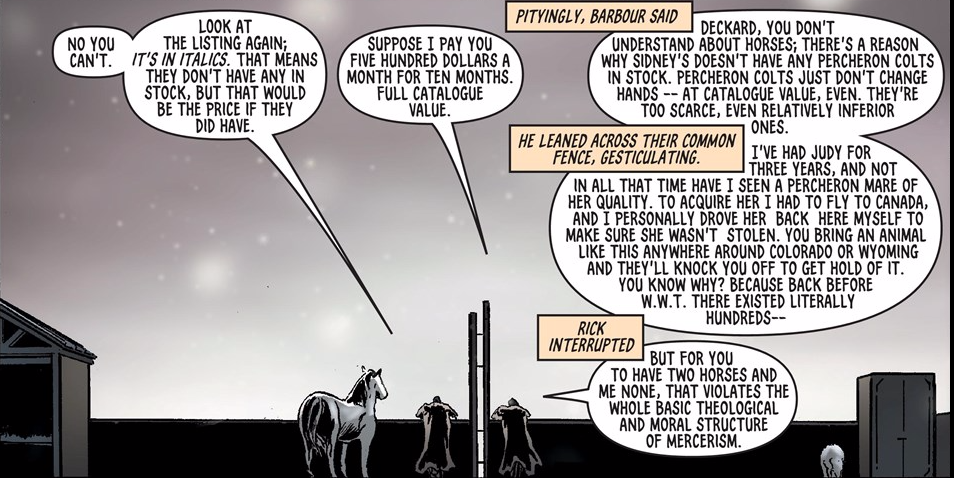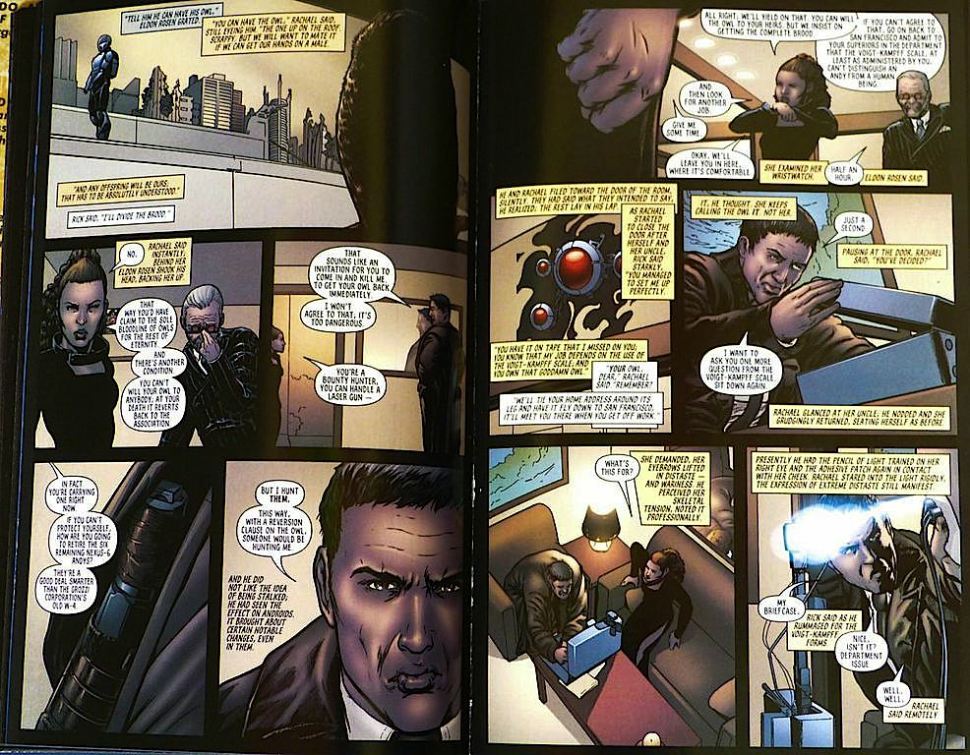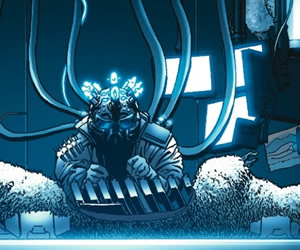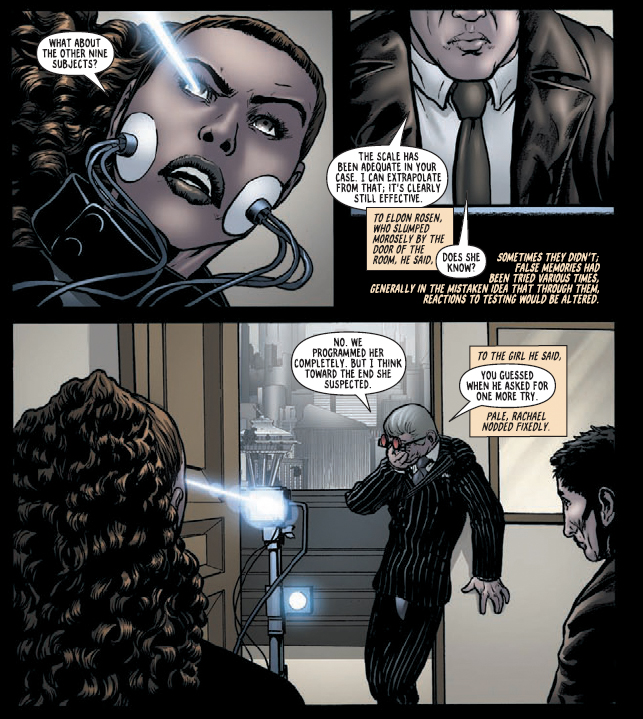Do Androids Dream of Electric Sheep?
Adaptations of any beloved material are a tricky tightrope to walk. No matter what you do, you’re likely to upset someone. If you don’t stick closely enough to the source material, then fans will feel betrayed (as films like I Am Legend and World War Z proved). But if you stick too closely to the original, the adaptation can feel pointless. With as many adaptations as we see both in the film industry and in comics, it’s a wonder that any of them are successful. Unfortunately in the world of comics, there is still a tendency to not really know how to adapt another medium into the graphic novel format. This week, I’ll be taking a look at an attempt to do exactly that with the science fiction classic Do Androids Dream of Electric Sheep?. This novel, originally written by Phillip K. Dick in 1968, was adapted into twenty-four issues and illustrated by Tony Parker and Blond. Published by BOOM! Studios in 2015, this adaptation was meant to be perfectly faithful to the well-loved original.
In the near future, World War Terminus has come and gone, leaving nuclear devastation in its wake. Many animal species have gone extinct either from the direct impact of the bombs or the lingering radioactive dust. Unsurprisingly, much of Earth’s population has chosen to move to colonies and abandon the Earth to the unfortunates who are unable to leave. In order to entice people to the colonies, the government offers a free android servant to anyone willing to emigrate. As you might expect, not every robot functions perfectly and bounty hunters are employed by every major city on Earth to hunt down androids who have killed their owners and escaped to Earth. One such bounty hunter is Rick Deckard. Suddenly promoted to top bounty hunter after the guy above him is incapacitated, Rick is tasked with “retiring” six highly dangerous androids hiding out in San Francisco. Rick must track down these androids (who are impossible to identify physically and must be discovered via a test for empathy) before they disappear into the abandoned buildings of the city and possibly take more human lives.
I have a somewhat complicated history with this story. I have loved cyberpunk since the very first time read William Gibson. While this story is not technically cyberpunk (it was published several decades before the stories that are considered the beginning of that sub-genre), it certainly influenced cyberpunk heavily. I first tried to watch Blade Runner years ago but was cursed with a version that had terrible sound and gave up halfway through. Then I tried to pick up Phillip K. Dick’s The Man in the High Castle, got thoroughly bored in the first chapter and put it back down. And then yesterday, I tried to start again with the novel on which Blade Runner was loosely based: Do Androids Dream of Electric Sheep?. Dick’s writing is a challenge. At times it’s dense and incredibly sneaky, at others an intensely plotted run from event to event. The dark, sly humor can feel odd and difficult to work through but the longer I stuck with it, the more I loved it. By the time I hit the third chapter, I couldn’t put it down. I say all this to mark that I get why someone might be turned off from reading the novel. Do Androids Dream of Electric Sheep? is not heroic, Star Wars style science fiction. Its characters are flawed and oftentimes petty individuals. Deckard gets in ridiculous fights with his wife, his neighbors and even his boss. He’s obsessed with getting a living animal instead of the fake, electric ones that have been all he could afford on a policeman’s salary. Half the time, he’s not even sure he wants to continue retiring “andys.” But those same flaws are what makes Deckard such a fantastic character. Through Deckard, Dick makes readers question what makes someone human, whether empathy is a uniquely human condition and whether that makes us better than something made entirely of circuits and wires. Dick is not a science fiction writer, he’s a philosopher. And yet, he maintains the action in a way that compels you to keep reading so you can find out what happens next. I still feel like I need to read the book three more times at least to get all of its facets. Do Androids Dream of Electric Sheep? is a classic because it forces readers to question everything.

Seriously. Look at this and tell me you made it easier or more desirable for people to read. So much text? Whyyyyyyyyyy???
So it’s natural that a lot would be riding on an adaptation. Unfortunately for BOOM! and fans of the both the novel and the movie, this adaptation is terrible. The whole point of having a graphic novel adaptation is that you can make a story more accessible for readers who might get bogged down in the author’s writing style or prefer a visual illustration of the story. The Do Androids Dream of Electric Sheep? omnibus is the exact opposite of that. Every single word of Dick’s text is replicated in the panels, creating walls of text that obscure the creative illustrations by Parker. Within the first page, I wanted to strangle whoever had come up with this concept. The result spoon feeds the text of the novel to the audience, sparing them only the effort of having to visualize the characters and scenes. The whole point of having a graphic novel is to allow the art to tell pieces of the story for you and only use text to show what the pictures cannot. There are bizarre inconsistencies like identical model androids looking completely different and strange sequences that appear to show the escaped androids in two completely different physical appearances. If someone had never read the novel, it’s possible that they might enjoy getting to see the story in a visual format. But the walls of text are likely to turn off anyone who looks for this experience. This is not an adaptation of the novel, it’s a straight illustration of it that never allows you to really see the illustrations due to being obscured behind so much text. It’s absolutely one of my biggest pet peeves in the graphic novel medium and I don’t understand the inability to identify that the strength of the medium lies in not having to tell everything. Reading this was an infuriating experience. The only part I truly enjoyed was the section of essays at the end by current comics authors and artists about how Phillip K. Dick and Do Androids Dream of Electric Sheep? influenced them and their writing/art.

As proof that I’m not kidding about that walls of text complaint. This makes Hickman look mild by comparison.
Do Androids Dream of Electric Sheep? is a story which forces readers to question the line between human and android, what becomes important to us and how we connect to each other and even understand ourselves. It’s a brilliant tale that has influenced much of popular culture since it was first published. This adaptation should have made that story accessible to readers who might be turned off by Dick’s writing style or just wanted to see the story re-told in a more visual way. Instead, it’s a bland copy with artwork that can’t be seen enough to be appreciated. I highly recommend the source material but I can only recommend this adaptation to those who want an illustrated version of the text.
– Cait



